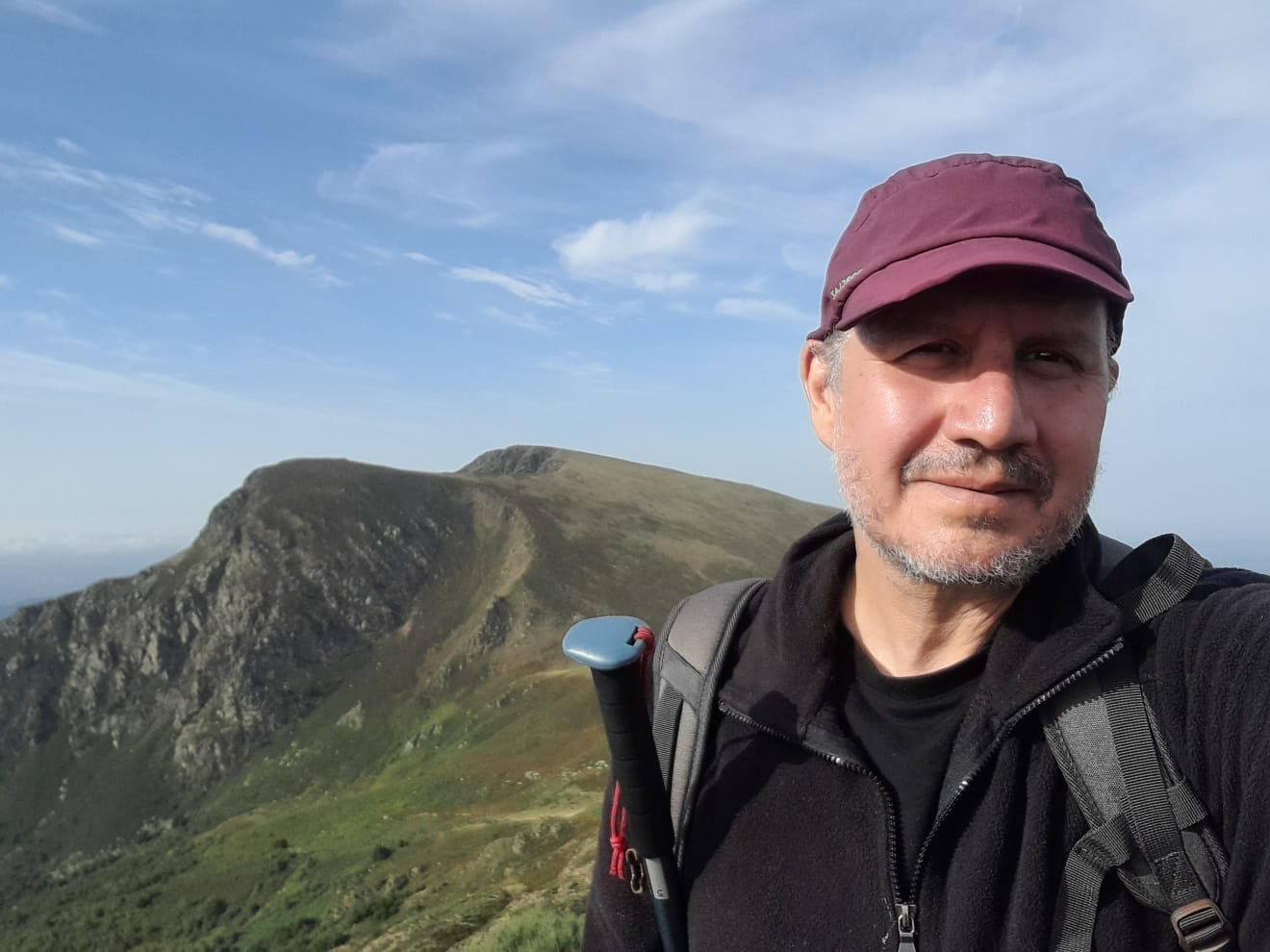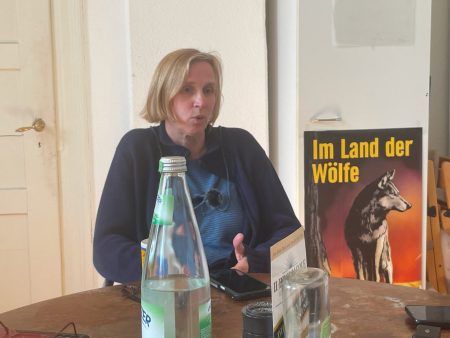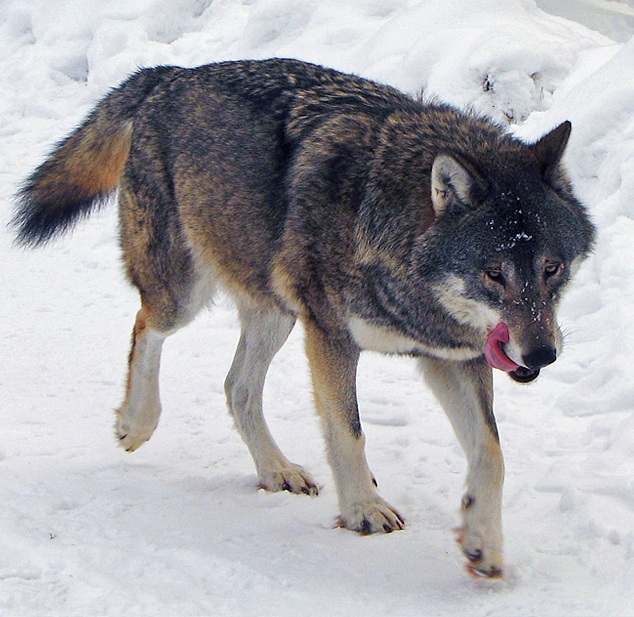Episode 158: Europe’s Big Three – Wolves, Bears, Lynx. Part 1: The Wolf’s Uneasy Return to Germany
October 24, 2025
Podcast: Play in new window | Download | Embed
Subscribe to Rewilding Earth Podcast: Spotify | Amazon Music | iHeartRadio | Email | RSS | More
Happy Wolf Awareness Week!

Julius Purcell, Narrator & Producer of the 3-part series “WOLF BEAR LYNX” Photo credit: Julius Purcell
Julius Purcell discovered his interest in audio while training as a journalist in the Middle East. He later worked as a deputy editor at National Geographic History magazine, a role that sparked his fascination with environmental history and rewilding. Julius’s audio series for the Rewilding Institute, “WOLF, BEAR, LYNX,” looks at predator restoration across Europe through the prism of history and politics. He lives in Barcelona, Spain — a great base for exploring Europe’s rewilding projects.

Gesa Kluth, LUPUS–German Institute for Wolf Monitoring
and Research, Germany. Photo: DANIEL SAUL
“If you have roe deer and red deer and wild boar, you also need the wolf. The wolf is a piece of the puzzle that belongs in this landscape. The deer and boar are the way they are because they have evolved together, with predators.” ~Gesa Kluth
Episode Summary:
In this episode, Julius Purcell explores the remarkable return of wolves to Germany after around 150 years of extirpation. Learn how Germany is learning to coexist with these iconic predators, the challenges that remain, and why the success of the wolf’s comeback is so significant. Along the way, Purcell examines the cultural, political, and ecological debates sparked by the wolf’s return and hears from experts, locals, and those living on the front lines of this predator coexistence story.

Canis lupus lupus Wolf_Kolmården.jpg: Daniel Mott from Stockholm, Sweden derivative work: Mariomassone – This file was derived from: Wolf Kolmården.jpg, CC BY-SA 2.0
Topics Covered:
- The history of wolves in Germany and their extinction
- The legal and ecological changes that enabled the wolf’s return
- The growth of the wolf population and its impact on landscapes
- Cultural and political controversies: rural vs. urban, symbolism, and “wolf politics”
- The role of the European Union and changes in wolf protection laws
- Challenges faced by farmers and rural communities
- Scientific research and monitoring of wolves
- Attitudes toward wolves in Germany and neighboring Poland
- Coexistence strategies and success stories
- Education, public perception, and the future of wolves in Germany
Wolf Gallery
About This Special Series – Europe’s Big Three: Wolves, Bears, Lynx
Our initial idea for a pilot episode on European rewilding was on the restoration of the bear population in the French Pyrenees. Producer Julius Purcell and Rewilding Institute’s Director of Digital Outreach Jack Humphrey wanted to include the bears’ spring awakening, and so, while the bears dozed in their dens in France, Julius used the time to go in search of Europe’s two other charismatic predators: wolves (in Germany and Poland); and Iberian lynx (in Spain).
The resulting three-part series tells the story of how populations of these three species bounced back under European nature policies after the Cold War. The very success of the predator programs, however, has strained coexistence in the countryside, and with the rise of populist politics, nature restoration now seems in retreat across Europe.
The European Union’s role in the plight of wolves, bears, and Iberian lynx is a crucial part of the big picture. But the episodes also delve into the local, showing how regional histories have hindered, and sometimes helped, the return of predators: the return of wolves to eastern Germany has become entangled in the toxic debate over immigration; bears in the French Pyrenees are embroiled in an agricultural opposition to the state that dates back centuries; and the success of the restoration of Spain’s Iberian lynx—which 25 years ago teetered on extinction—was thanks, in part, to its perception as a “national” animal.
The year-long production process takes the listener into rich and varied European landscapes, put into context by some of Europe’s most distinguished conservation experts. The rapidly evolving situation is reflected in the episodes: As populist parties made big gains in elections, conservationists reeled from diluted EU protections on wolves. While the Iberian lynx has always enjoyed support in southern Spain, it became apparent that this support does not extend to the north of the country.
The series shows how Europe’s post-1989 consensus on nature is under strain—but also offers hope. A whole generation has grown up with, and accepts, wolves, bears, and Iberian lynx in their landscapes. And while nature-hostile politics portrays the predator-human relationship as fundamentally intractable, the episodes show that tolerance varies across cultures and baselines. Where there is a will, there is usually a way to allow the wild to return.
Wolf Credits
Produced and presented for the Rewilding Institute by JULIUS PURCELL. With thanks to DANIEL SAUL of R&D STUDIO for production support and advice.
With thanks to contributors:
In Germany: LEA WIRK, ILKA REINHARDT, and GESA KLUTH (LUPUS–German Institute for Wolf Monitoring and Research); STEPHAN KAASCHE (wolf guide, wolfswandern.de): REBECCA PATES (Professor in Political Theory, University of Leipzig).
In Poland: ALICJA ŚMIAŁEK, PAWEL WALENDOWSKI and his parents, and WAWRZYNIEC PUTKIEWICZ.
Music:
Prepared piano: JORGE GUARIN and PALOMA ORTS;
Guitar: ASIER VAZQUEZ MINIÑO
Director of Digital Outreach (D.O.D.O.) for The Rewilding Institute
Host and Producer of the Rewilding Earth Podcast
Jack started Rewilding work as Executive Director of Sky Island Alliance in the mid-1990’s, organizing the Sky Island Wildlands Network design, ripping up illegal roads on forest service lands, installing wolf acclimatization pens on Ted Turner’s Ladder Ranch & conducting howling surveys to help make way for the final stage of the Lobo reintroduction program in the Southwest.
Through the years, Jack has worked with Dave Foreman and the Rewilding Gang to further Rewilding initiatives and education.

